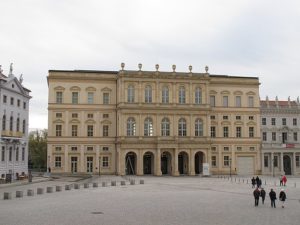The Museum Barberini is one of the newer museums in the Berlin area. It opened in 2017 in Potsdam, immediately southwest of Berlin, to display the collection of Hasso Plattner, co-founder of the German software company SAP SE and one of the wealthiest individuals in the country. The permanent collection mostly consists of Impressionist and Post-Impressionist paintings, while the rotating exhibitions feature loans ranging from the Old Masters to contemporary art. And now the Museum Barberini may be caught up in a small bribery scandal.
The Barberini is one of two museums Plattner has founded in the greater Berlin area, the other being Das Minsk, dedicated to modern and contemporary art with an emphasis on East German artists. It is named after the Barberini Palace, the eighteenth-century neoclassical structure that houses the museum. An Allied air raid destroyed much of the palace in 1945, with the property going unused until 2013. A local redevelopment project saw it completely rebuilt, with Plattner footing the bill. The museum opened in 2017, but the bribery incident occurred during construction. A German court found that a civil engineer serving as part of the management team for the museum’s construction asked for money in exchange for giving rival construction companies insider information about the project. This information, which included transcripts of meetings among the managerial team, resulted in the company that agreed to pay the bribes winning the contract. The firm promised him €80K, of which they paid €29K before terminating the payments due to the investigation. There was also another incident where the engineer helped a friend of his earn money from the project as a subcontractor. Emails between the two reveal that the engineer advised his friend to be at the construction site at least twice a week to establish credibility.
The court has sentenced the engineer to fourteen months in prison and a €113K fine. This is in addition to paying €20K to a local children’s charity. The subcontractor received a suspended sentence and was ordered by the court to pay €180 per day for one hundred twenty days, adding up to €21.6K. Fortunately, the museum’s construction was not used with public money, otherwise the scandal would have had far greater consequences.

